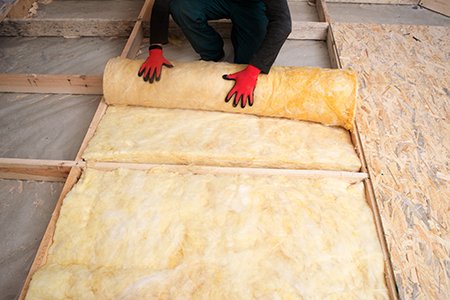
Quality home insulation is essential: it minimizes your heating and cooling costs, decreases noise levels, benefits your home’s resale value, and contributes to the structural integrity of your home. A well-insulated home also helps keep pests out! When you look to professional insulation companies for help, you can expect a technician to inspect your home to determine the best option for your home insulation. At Bug Out, we offer both blown-in insulation and batt insulation, depending on what’s right for your St. Louis area home.
Benefits of Blown-In Insulation
Blown-in insulation is a proven and effective option. This method of home and attic insulation installation involves propelling the material into gaps to reduce air flow. There are plenty of benefits to blown-in insulation:
- It is ideal for attic insulation because of its ability to fill large spaces and hard-to-reach areas.
- It works well to keep your home insulated against both high heat and harsh cold, and it settles minimally over time.
- You can choose from two types: fiberglass for improved fire resistance or cellulose for sustainability and durability.
Need a Home Insulation Estimate?
We'll call you! Leave your information below.
What Is Batt Insulation?
This is a traditional form of insulation that comes in rolls and is stretched along walls and attics post-construction. It is usually made of fiberglass and lined with a paper backing. You can shape and cut it easily to fit between rafters, joists, and studs without leaving any space for air to flow through. While it is often a less expensive option for home insulation, if installed properly and in the right circumstances, it can be nearly as effective as pricier insulation options.
Basement Insulation
Because hot air rises and cold air sinks, basements are typically cooler than the rest of a house. This temperature difference doesn’t just affect your comfort, it also affects your finances. Insulating your basement better could save you significant money on your energy bills.
There are several insulation types that you could use for your basement walls. Here are some of the most common options:
- Spray Foam: This is an option for finished basements. It needs to be sprayed behind the drywall.
- Foam Board:Typically made of polyurethane or polystyrene panels, this insulation can be installed by a homeowner but it’s likely to last longer and work better if it’s professionally installed.
- Fiberglass batt insulation: Due to the moisture in basements you’ll need a vapor barrier. You can either install faced batt insulation with a paper layer that serves as a vapor barrier or install unfaced fiberglass batt insulation and add a layer of plastic sheeting.
Our experts can examine your home and create an insulation plan tailored to your unique circumstances.
Attic Insulation
For attics, creating a barrier to airflow is more important than in a basement. Here is a summary of the most common options for attic insulation:
- Spray Foam: The best performing attic insulation, spray foam is expensive and should only be installed by professionals or those experienced with using a spray foam gun.
- Fiberglass batt insulation: Fiberglass batt typically doesn’t perform as well in attics as in basements due to the typically greater airflow in attics and relatively low density of fiberglass batt.
- Cellulose insulation: This type of blown-in insulation is made from shredded recycled paper which has been treated with borate for pest control and fire resistance. Also known as TAP (Thermal Acoustical Pest Control) Insulation, learn more here.
- Loose fill fiberglass insulation: Loose fiberglass is blown-in like cellulose insulation. It typically performs better than fiberglass batt in attics because it’s denser and fills in the nooks and crannies better.
Experienced Insulation Contractor
At Bug Out, we strive to make your home more comfortable for you and more inhospitable to pests! We provide insulation services that are licensed, insured, and guaranteed, providing you with a more comfortable and potentially more valuable home or business. Contact us today for a free consultation.
Back to Residential Pest Control